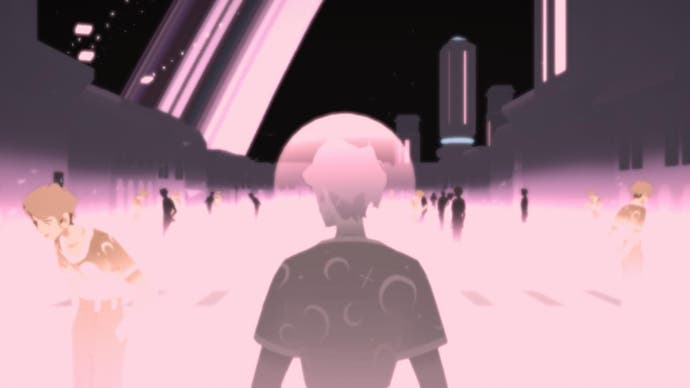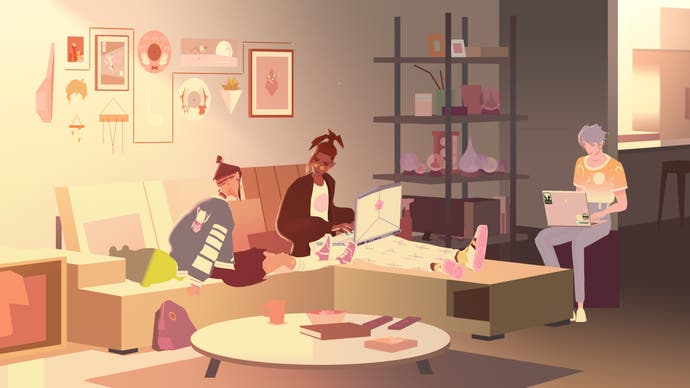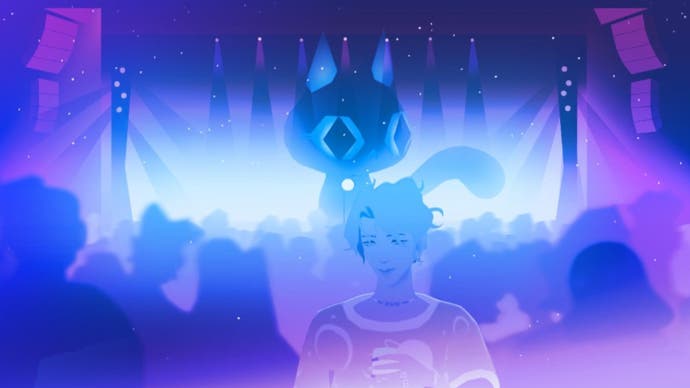We Are OFK review - frothy pop music meets likeable teen drama
Video killed the game star.
The concept album has been around for decades as a way for musicians to focus their work on a central theme. But what if the concept album was actually a video game?
That's what We Are OFK is attempting to achieve, though it's not the first attempt. Björk's Biophilia album from 2011 came with an interactive app, while Sayonara Wild Hearts (2019) was a music video game that lasted as long as an album and warrants repeat plays.
With We Are OFK, Team OFK has created a visual novel that contextualises an EP, detailing the story of its fictional band. And the music is set to be released officially, delivered by its anime band members Gorillaz-style. As a visual novel it offers likeable teen drama with welcome representation, but as an interactive music game it disappoints.
Over the course of five episodes, released weekly, the plot follows four young musicians in L.A. as they form the band OFK. Itsumi is a sweet, naive classical pianist; Luca is a self-centred aspiring songwriter; Carter is their wise and mysterious outsider friend; and Jey is a producer with more mature concerns about her career (who proved the most relatable for me).
Each episode lasts about an hour and culminates with an interactive music video. It's here that We Are OFK falters: the minimal video interactions are simplistic and don't affect the music in any way. Essentially it's just giving you something to do with your fingers while you listen to the music, like popping bubbles or collecting cats. It adds little to the experience and feels gimmicky as a result. Where Sayonara Wild Hearts uses unique visuals and interactions to punctuate the music and Rez gives musical feedback to its gameplay, We Are OFK offers a few simple controller taps along with your toes.
The music itself, though, is good! The fizzy dreampop vibe is fitting for the teen story, the bubbly synths matching the clean pastel artwork. So far Follow/Unfollow is the only song to be officially released, a bittersweet song about young love with references to social media, gaming, and a suitably catchy hook. It epitomises everything We Are OFK is about.

Story-wise, We Are OFK is all teen angst, emo vibes and heavy sighs. OFK themselves are thirsty, misunderstood twenty-somethings with heads full of dreams and hearts full of self-doubt as they seek to leave behind a lasting musical legacy. They're balancing day jobs (in gaming no less!) with their passion for music, their relationships, and the expectations of parents. The sadboy overthinking is relatable. It sometimes feels similar to Netflix anime Carole and Tuesday, or Life is Strange: Music Industry Edition, just without the supernatural.
Much of the story plays out in that great form of introverted gen z communication: texting. When they're not sending drunk or horny texts to each other full of cute emojis, these characters are over-philosophising about life in group chats or speaking in song lyrics, which does get a little tiresome. References to Cinnamongram, Twibber and Vidworld give a sense of parallel reality, but the video game nods are more amusing: there's a Tabemon character called Pikanood, which made me laugh out loud, and I appreciated the JRPG references. There are even characters called Biggs and Wedge.

It's fun to read through these conversations and choose dialogue options, but there's no way of altering the soap opera drama. You can't make choices or interfere with the careers of these young people. Instead it's mostly passive watching as they make mistakes but somehow still release some catchy tunes.
It brings into question: what exactly does the game add to the music? It certainly provides an enjoyable story that adds depth to otherwise frothy pop songs. The music acts as a focal point that reflects the mood of that episode. But as a game its appeal is limited. I think we're still a ways off a virtual pop band truly breaking into the mainstream through gaming.
The biggest success of the game, though, is its sense of authenticity. The LGBT+ representation is excellent, with diverse characters normalising queer relationships. The developer's devotion to authentic twentysomething reference points is commendable. And where so many music stories push songwriting and acoustic instruments as more "authentic" than manufactured pop, here the secret to success is simple: just be yourself.



